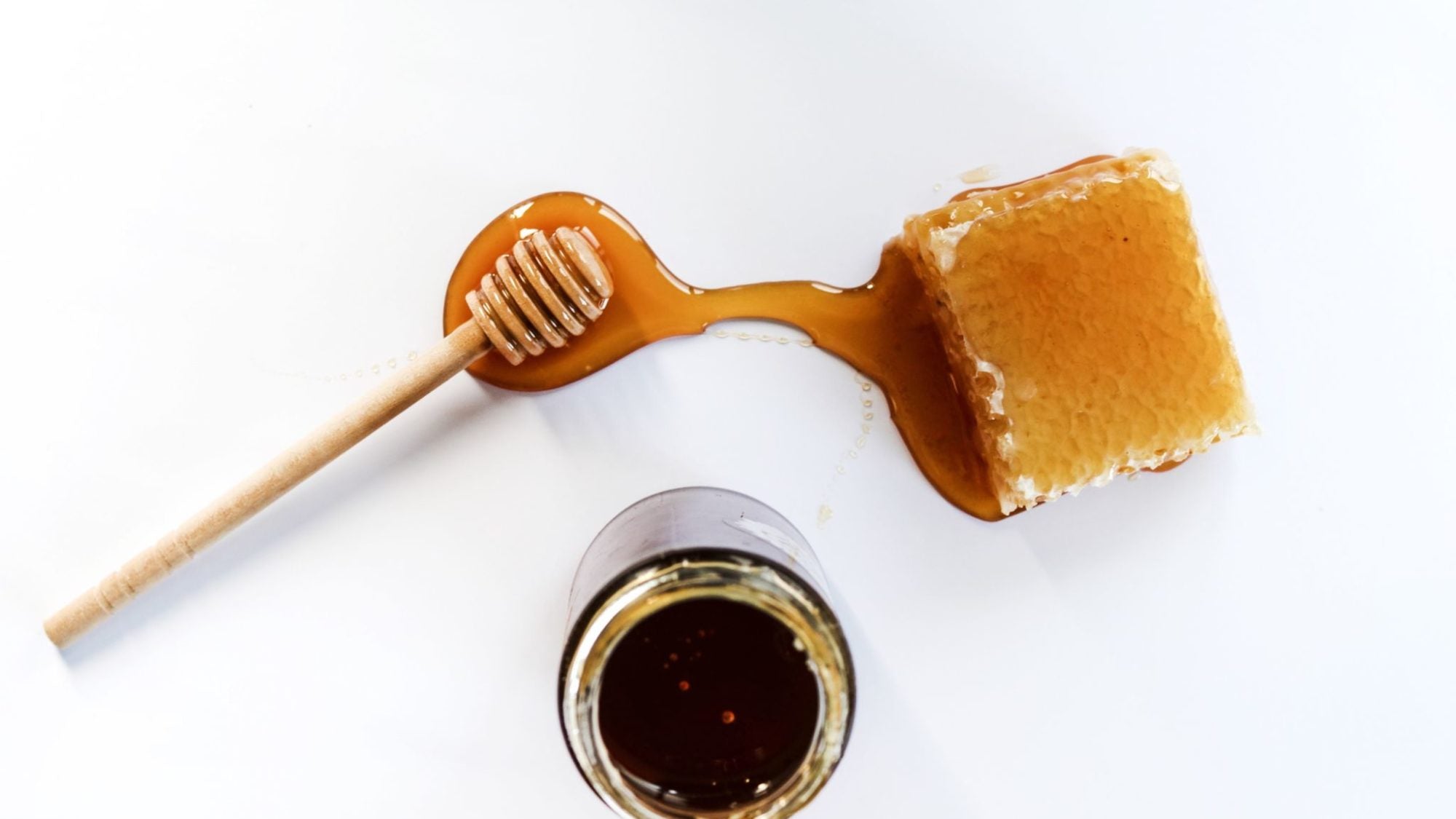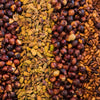Honey on Keto: How Many Carbs Are in Honey

Produced by bees from the sugary secretions of plants, honey does not just taste great, but it is also natural as well as it has plenty of nutrition benefits due to its high antioxidant content.
That’s why nature’s own sweetener is considered a healthier alternative to sugar.
But when you are on keto, you want to keep your carbs at the minimum to facilitate ketosis. And just like sugar, honey is quite high in carbs. So does this mean that you should leave out honey from your diet?
In this article, we’ll investigate this question along with crucial facts about honey.
What Is Honey And How Is It Different From Sugar?
Humans have a long history of honey consumption. The first historical evidence (a cave painting found in Valencia, Spain) for “honey hunting” dates back to 8,000 years ago while the oldest honey remains were found in Georgia in a 5,000 years old ancient tomb1.So basically honey is a thick, golden liquid made by bees using the nectar of flowering plants. But how is it different from sugar?
Honey and sugar are both carbs that consist of two types of sugar: glucose and fructose. But the concentration of the two is not the same.
- Sugar is 50% glucose and 50% fructose
- Honey contains 30% glucose and 40% fructose.
While honey has slightly more calories than sugar, honey tastes sweeter, so less is required to reach the same level of sugar’s sweetness.
The enzymes bees add to honey breaks down a part of the sugars that makes the sweetener easier to digest than sugar, which has to be ingested before broken down.
Also, honey is less processed than sugar, which is one of the aspects that contribute to its sweeter taste. As raw honey can be consumed, people can choose this form of the sweetener to avoid pasteurized varieties that contain less antioxidants and enzymes.
Due to its higher fructose content as well as the absence of trace minerals, sugar is higher on the glycemic index (GI) than honey, which means that it raises the blood sugar levels of humans more quickly.
Is Honey Healthy?
Honey’s use as a medicine dates back to the ancient times as it has several benefits. Honey has been used by humans to2:- Ease a cough in children
- Reduce seasonal allergy symptoms
- Heal wounds
- Improve seborrheic dermatitis (an itchy and flaky scalp condition)
- Reduce hair loss
Honey’s health benefits over sugar include increased energy, weight loss (in case of moderate consumption), improved sleep quality, wound healing, lower chances of developing diabetes, antibacterial effects as well as an increase in the antioxidants that are found and distributed throughout the body.
How Many Carbs And Calories Are In Honey?
While one tablespoon of sugar contains 46 calories, the same amount of raw honey contains a total of 64 calories[3]. The calories of honey are higher than sugar, but you should remember that it’s sweeter, so less honey is required to reach the same sweetness.And here comes the bad part…
Due to its carbohydrate content, honey is certainly not keto-friendly.
A tablespoon of raw honey has 17g of carbs (16 of which come from sugar). The fat content of the sweetener is neither ideal for ketoers as honey contains zero grams.
In addition to all this, honey contains no dietary fiber and only 0.1g of protein.
Will Honey Prevent Ketosis?
So honey isn’t keto-friendly, but do you have to completely avoid it while you are on the diet?Fortunately, the answer is no.
Ketosis is a metabolic state and to reach it, you need to keep your carb intake at the minimum while increasing the fat you consume. This way, your body will produce and rely on ketones for energy instead of glucose.
To remain in ketosis, the average person can eat between 25 and 50g of carbs per day. The permitted carb intake can be higher for active individuals who can consume the daily “dose” of up to 100g to stay in ketosis.
One tablespoon of honey probably won’t prevent your body to go into ketosis. But if you eat honey in huge quantities, you shouldn’t be surprised that ketosis won’t commence and your keto diet’s progress will reverse.
So if you are careful when eating honey and keep your daily carb intake within the ranges I mentioned, then honey won’t kick you out of ketosis.
Honey-Compatible Keto Diets
I want to show you a few keto diet types that are compatible with honey consumption:Cyclical Ketogenic Diet (CKD): CKD dieters follow the traditional keto diet for 5-6 days, then they are allowed to increase their carb intake for 1-2 days. On those “loading” days, you are allowed to eat high-carb meals like honey. But you should note that the CKD should be conducted in conjunction with high-intensity workouts otherwise your loading days will kick you out of ketosis.
Targeted Ketogenic Diet (TKD): The TKD is also centered around workouts. An hour before or after your workout, TKD dieters are allowed to consume between 20 and 50g of extra carbs, which could mean around 1-2 tablespoons of honey (your carb intake is determined by the intensity of your workout and how much calories you burn).
5 Great Sweetener Alternatives You Should Try Instead Of Honey

If you like your meals sweet but don’t want to be kicked out of ketosis, then you should look for alternative sweeteners that you can replace honey with.
Stevia
Similarly to honey, stevia is a natural sweetener that is derived from the plant Stevia rebaudiana4. Stevia is perfect for ketoers as it’s a non-nutritive sweetener, meaning that it contains little to no carbohydrates.Multiple human and animal studies have shown that stevia is great for lowering blood sugar levels.
As stevia is much sweeter than sugar, you need less to achieve the same flavor. So, for each cup (200g) of sugar, only one teaspoon (4g) of stevia is needed.
From drinks to desserts, you can use stevia as a sweetener for your meals. Stevia is widely available in stores and supermarkets and it is mostly sold in liquid or powdered form.
Sucralose
Unlike stevia and honey, sucralose is an artificial sweetener. The main difference between table sugar and sucralose is that the latter is not metabolized, which means that your body doesn’t digest the sweetener, so it doesn’t provide any calories or carbohydrates.As most artificial sweeteners have a bitter taste, most people are using the sucralose-based sweetener Splenda that can replace sugar in a 1:1 ratio. But you should be careful when using Splenda as it contains two additional substances, maltodextrin and dextrose, two nutrients that have 0.91g of carbs and 3 calories per serving packet (1g).
One downside of sucralose is that you can’t use it to replace sugar in recipes that require baking as some studies have found that the sweetener could produce harmful compounds when exposed to high temperatures.
On the other hand, for meals that require no cooking or baking, sucralose is a great low-carb alternative to sugar.
Erythritol
Erythritol stimulates your sweet taste receptors on your tongue to mimic the taste of sugar like other sugar alcohol types.Containing only 0.2 calories and 1g of carbs in every gram of erythritol, the sweetener is 80% sweet compared to regular sugar.
While it doesn’t cause the digestive issues other types of sugar alcohols (due to its smaller molecular weight), erythritol may help to lower blood sugar levels in your body.
Unlike sucralose, erythritol can be used for both baking and cooking as a sugar alternative. But, before using it as your go-to sweetener, you should note that erythritol can create a slightly gritty texture for your meals as it doesn’t dissolve as well as sugar.
Xylitol
When you are chewing sugar-free gum, do you feel that it contains an alternative sweetener instead of sugar?If you don’t, then it has xylitol inside, which is a sugar alcohol that’s as sweet as sugar. This alternative sweetener has 3 calories per gram as well as 4g of carbs per teaspoon (4g).
Like other sugar alcohols, xylitol’s carbs don’t count as net carbohydrates as the sweetener doesn’t increase your blood sugar or insulin levels to the extent sugar does.
With an exchange ratio of 1:1 between xylitol and sugar, you can easily add the sweetener to coffee, tea, shakes, and smoothies for extra flavor.
Using xylitol for recipes that require baking is a bit harder as the sweetener increases dryness as well as absorbs moisture. To fix this problem, you can add extra liquid to the recipe.
When used in high doses, xylitol can cause digestive problems, so you should use the sweetener in moderate dosage as well as you should cut back your intake if you notice any adverse effects.
Monk Fruit
The southern Chinese fruit, monk fruit, is also great for replacing honey and sugar in your diet. Not the whole fruit, just the extract.Monk fruit sweeteners have natural sugars and compounds inside (called mogrosides), antioxidants that contribute to most of the fruit’s sweetness.
Monk fruit is 100-250 times sweeter than sugar, and it contains zero carbs or calories.
The mogrosides inside monk fruit stimulate the release of insulin that can help you in managing blood sugar levels.
While there are no restrictions for using the sweetener, you should always carefully check the ingredients of monk fruit extracts as manufacturers often mix it with sugar or other sweeteners that can increase its calorie and carb content.
Your Life With(out) Honey
In this article, you learned that honey isn't keto-friendly because of its carb content.But if you can’t resist, try to minimize how much you have.
If you want to leave out honey completely from your diet, replace it with alternative sweeteners, such as stevia and sucralose.
You have all the options, so it is now up to you to choose the best for your keto diet.
-
Posted in
Authority Article, Keto Foods, Nutrition, Nutrition Article, Starting Keto




